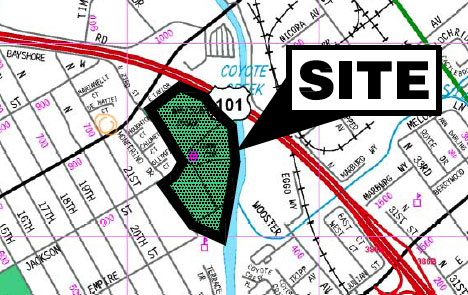An--Interesting--Note from the Past
Before I bought my current house four years ago, I lived with Remington and Jake for a year in a horrific rental at the corner of Taylor and Twenty-First in north San Jose. One of the few saving graces of the house was that it was wonderfully close to Watson Park, a huge public park that was hardly ever used by anyone, at least not during the hours when I usually walked the dogs. There were tremendous grassy fields over which I could throw the frisbee again and again for Jake, surrounded by dozens and dozens of gorgeous mature trees containing squirrels, so that Remington would exercise himself by running and running and running from one place to another. One side of the park, along Coyote Creek, was left more or less au natural; a path ran parallel to the creek but not too close to it, among meadowlands and semi-forested areas, and both dogs loved exploring, their noses down in the dirt, racing along raising dust paths behind them, rejoining me and exploding away again. And the park was so huge that I could get in my own walk of half an hour or more just following the frisbee and the dogs around and back again.
 |
| Watson Park, San Jose; my horrid rental house circled in orange. Just half a block over and one block down. |
Now, boys and girls—the reason I have this map labeled "site" rather than the more congenial "park" is because I obtained it from a government web site—and the reason I went there is because I came home from a weekend away from home to find this splashed across the front of the San Jose Mercury (excerpted):
Troubled park's buried past
EXTENT OF POSSIBLE PROBLEMS STILL UNKNOWN AS CITY PREPARES TO SPEND $800,000 ON AREA STUDY
Years before San Jose closed large parts of Watson Park this summer because of environmental contamination, city officials were told at least three times that the popular spot for dog walkers, families, gardeners and soccer players had been the city's main garbage plant for decades.
The city was informed as early as 1987 and again in 2002 and 2003 that the land had housed a major dump and incinerator...
It wasn't until a construction crew uncovered burned trash beneath the park last summer that the city started environmental studies, discovering elevated levels of lead, arsenic and other toxins.
In addition, none of the information released by the city has revealed the extent of the possible problems or the size of the dump and incinerator. A Mercury News review of historical documents found that the incinerator, dominated by a 125-foot-tall smokestack, handled up to 75 tons of garbage a day. Old property maps show that the city-owned site likely extended beyond Watson Park, possibly onto land that now holds nearby homes and Empire Gardens Elementary School.
... Both garbage and incinerator remains -- now recognized as sources of toxins -- were apparently buried at the dump and along the banks of nearby Coyote Creek.
... the hazards posed by old dumps and incinerators have been well-documented. Similar sites around California have proved to be laced with toxins such as polychlorinated biphenyls and elevated levels of lead and arsenic -- all found in Watson Park soil. The potential for problems at such sites is so serious that in 2003, state regulators issued rules for handling old ``burn dumps.''
The full article will be available on the Web for a limited time:
here.
It goes on to cite a long history of reports that call out the possibility of problems that somehow no one took seriously.
So for a year the three of us were romping in a toxic mess. Isn't that nice to know?
And of course the first thing that hits me like a runaway truck in my stomach: Is that what killed Remington? Complete list of labels






1 Comments:
A
Post a Comment
Links to this post:
Create a Link
<< Home